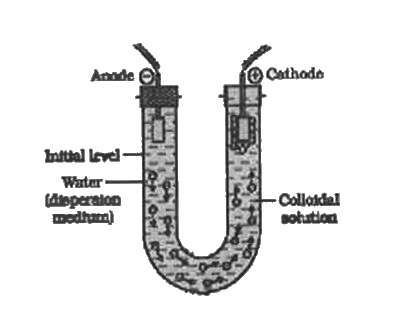What is an electrophoresis ? Explain.Solution in Kannada
Video Solution
Text Solution
The movement of colloidal particles under an applied electric potential is called electrophoresis.

The existance of charges on colloidal particles is confirmed by electrophoresis experiment.
When electric potential is applied across 2 platinum electrodes dipping in a colloidal solution, the colloidal particles move either to cathode or to an anode depending upon charge carried by the colloids.
Positively charged particles move towards the cathode and negatively charged particles move towards the anode.
|
Topper's Solved these Questions
- SUPPLEMENTARY EXAMINIATION QUESTION PAPER JUNE 2017Book:SUBHASH PUBLICATIONChapter:SUPPLEMENTARY EXAMINIATION QUESTION PAPER JUNE 2017Exercise:PART E
Explore 22 Videos
- THE 'd' - AND 'f' - BLOCK ELEMENTS Book:SUBHASH PUBLICATIONChapter:THE 'd' - AND 'f' - BLOCK ELEMENTS Exercise:Question and Answer
Explore 62 Videos
Similar Questions
What is Reverse Osmosis? Mention its one partical utility.
View SolutionDefine the term transition element.
View Solution(a) What is enzyme catalysis ? Give an example.
(b) What type of emulsion is milk ? Explain.
(c ) Explain electrophoresis with a labelled diagram.
View SolutionExplain with a neat sketch the phenomenon of electrophoresis.
View SolutionWhat is electrophoresis?
View SolutionExplain agrose GEL electrophoresis .
View SolutionExplain the Electrophoresis term.
View SolutionExplain Electrophoresis.
View SolutionExplain the following tem : Electrophoresis.
View SolutionExplain the following terms : Electrophoresis
View SolutionExplain the terms : electrophoresis, zeolite and dialysis.
View SolutionExplain Electrophoresis.
View SolutionExplain electrophoresis.
View Solutionइलेक्ट्रोफोरेसिस क्या है ?
View SolutionExplain the following terms
electrophoresis
View Solution

